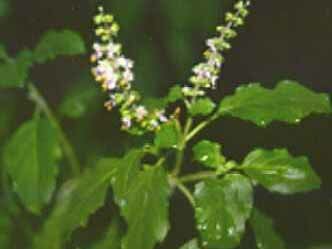|
Tulsi (Ocimum sanctum) is a widely grown, sacred plant of India. It belong to the labiateae family. It is also called by names like Manjari/Krishna tulsi (Sanskrit), Trittavu (Malayalam), Tulshi (Marathi) and Thulsi (Tamil & Telegu). It is called Holy Basil in English. The natural habitat of Tulsi varies from sea level to an altitude of 2000 m. It is found growing naturally in moist soil nearly all over the globe. In India, Hindus grow Tulsi as a religious plant in their homes, temples and their farms. They use Tulsi leaves in routine worship. This plant is also grown as a pot herd and in home gardens.
 Tulsi is a branched, fragrant and erect herb having hair all over. It attains a height of about 75 to 90 cm when mature. Its leaves are nearly round and up to 5 cm long with the margin being entire or toothed. These are aromatic because of the presence of a kind of scented oil in them. A variety with green leaves is called Shri Tulsi and one with reddish leaves is called Krishna Tulsi. Tulsi flowers are small having purple to reddish color, present in small compact clusters on cylindrical spikes. The fruits are small and the seeds yellow to reddish in color. Because of its medicinal virtues, Tulsi is used in Ayurvedic preparations for treating various ailments. Tulsi is a branched, fragrant and erect herb having hair all over. It attains a height of about 75 to 90 cm when mature. Its leaves are nearly round and up to 5 cm long with the margin being entire or toothed. These are aromatic because of the presence of a kind of scented oil in them. A variety with green leaves is called Shri Tulsi and one with reddish leaves is called Krishna Tulsi. Tulsi flowers are small having purple to reddish color, present in small compact clusters on cylindrical spikes. The fruits are small and the seeds yellow to reddish in color. Because of its medicinal virtues, Tulsi is used in Ayurvedic preparations for treating various ailments.
Tulsi leaves contain a bright yellow volatile oil which is useful against insects and bacteria. The principal constituents of this oil are Eugenol, eugenol methyl ether and carvacrol. The oil is reported to possess anti-bacterial properties and acts as an insecticide. It inhibits the in vitro growth of Mycobacterium tuberculosis and Micrococcus pyogenes var. aureus. It has marked insecticidal activity against mosquitoes. The juice of leaves, and or a concoction, called jushanda, a kind of tea, gives relief in common cold, fever, bronchitis, cough, digestive complaints, etc. When applied locally, it helps in eradicating ringworms and other skin diseases. Tulsi oil is also used as ear drops in case of pain. The seeds are used in curing urinary problems. Aphrodisiac virtue has been attributed to it, where powdered Tulsi root with clarified butter (ghee) is prescribed.
In addition to Ocimum sanctum proper, some other species on varieties of this plant also go by the same name viz Tulsi. These are Ocimum canum (Ram tulsi or Kali tulsi), Ocimum basilicum or bobai tulsi, Ocimum kilmand, O. scharicum or camphor tulsi, etc. The medicinal effect of all these varieties is nearly similar, if not the same. The best part of the matter is that certain Indian scientists are at the threshold of finalizing their discovery of a reliable medicine against cancer out of Tulsi plant.
Tulsi is one of the most important plants of Haryana and India. Therefore more research is needed for large scale cultivation of the plant in vacant lands and spaces. More research is also required in the use of Tulsi leaves, oil and extracts for a large number of medicinal uses and as an organic insecticide. The Ch Devi Lal Herbal Nature Garden is involved in researching and cultivating many medicinal herbs including Tulsi and Safed Musli.
|
|
 Tulsi is a branched, fragrant and erect herb having hair all over. It attains a height of about 75 to 90 cm when mature. Its leaves are nearly round and up to 5 cm long with the margin being entire or toothed. These are aromatic because of the presence of a kind of scented oil in them. A variety with green leaves is called Shri Tulsi and one with reddish leaves is called Krishna Tulsi. Tulsi flowers are small having purple to reddish color, present in small compact clusters on cylindrical spikes. The fruits are small and the seeds yellow to reddish in color. Because of its medicinal virtues, Tulsi is used in
Tulsi is a branched, fragrant and erect herb having hair all over. It attains a height of about 75 to 90 cm when mature. Its leaves are nearly round and up to 5 cm long with the margin being entire or toothed. These are aromatic because of the presence of a kind of scented oil in them. A variety with green leaves is called Shri Tulsi and one with reddish leaves is called Krishna Tulsi. Tulsi flowers are small having purple to reddish color, present in small compact clusters on cylindrical spikes. The fruits are small and the seeds yellow to reddish in color. Because of its medicinal virtues, Tulsi is used in